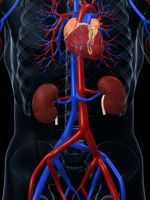Prostate Cancer Therapy Linked to Acute Kidney Injury

A team of researchers at McGill University in Montreal have found that the hormone-targeted therapy used to treat prostate cancer in men can also increase chances of developing acute kidney injury. Though hormone-targeted therapy is mostly used to combat the most aggressive forms of prostate cancer, there are other grave risks associated with it, often creating a precarious risk-benefit balance.
The study, which appeared in the Journal of the American Medical Association (JAMA) on July 17, showed that androgen deprivation therapy could cause a 250 percent increase in a man's chances of developing acute kidney injury. The rapid loss of kidney function associated with acute kidney injury has a 50 percent mortality rate.
"Our study does raise the concern that perhaps we should be more careful in prescribing androgen deprivation therapy in patients who do not have the clear indication for it," Laurent Azoulay, a researcher at McGill, told Reuters Health.
The researchers studied 10,250 men with nonmetastatic prostate cancer between 1997 and 2008, checking to see which patients developed acute kidney injury. They found that 232 of the 10,250 men developed acute kidney injury, and out of the 232, over half were undergoing androgen deprivation therapy at the time. Because hormonal therapy affects testosterone and estrogen levels in men, and hormones play a role in kidney function, Azouly believes it's possible that hormonal therapy and kidney failure could be linked.
The prostate, meaning "one who stands before" or "protector" in Greek, is a gland in the male reproductive system, located below the bladder. Prostate cancer usually occurs in older men.
Androgen deprivation therapy (ADT), also called androgen suppression therapy, is typically reserved to treat aggressive, advanced prostate cancer cases — usually when the cancer has spread to other parts of the body. Through medication or surgery, ADT stalls the growth of prostate cancer cells by decreasing the number of hormones in a man's body.
Past research published in the Journal of Clinical Oncology showed that androgen deprivation therapy was also connected to an increased risk of heart attack. It seems that unless the prostate cancer is aggressive and in an advanced stage, the risks associated with ADT could be much greater than the benefits.
"There is a big debate over who should receive androgen deprivation therapy, and the timing of use," Azoulay told WebMD. "In patients whose prostate cancer has spread, the benefits outweigh the risk, but now there's this jump to using [androgen deprivation therapy] in patients who would not typically die from prostate cancer. In that subgroup of patients, the risks might outweigh the benefit."



























